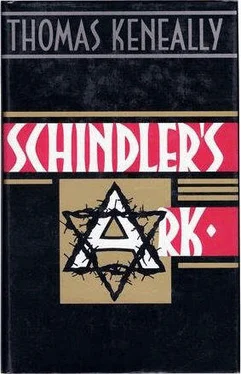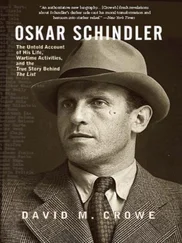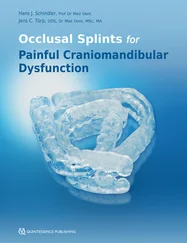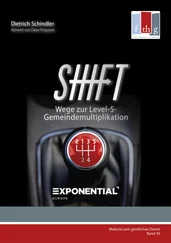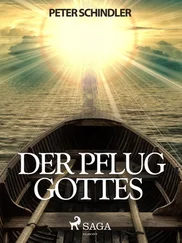“Well,” Herr Schindler growled at him.
“I’m a German. So there we are!”
All very well, Stern almost intoned privately behind his sodden handkerchief. In that case, lift the edict.
For Itzhak Stern was a man—even now, in only the seventh week of the New Order in Poland—not under one edict but already under many.
Hans Frank, Governor General of Poland, had already initiated and signed six restrictive edicts, leaving others to his district governor, Dr. Otto Wächter, an SS Gruppenführer (equivalent to major general), to implement. Stern, besides declaring his origins, had also to carry a distinctive registration card marked by a yellow stripe. The Orders-in-Council forbidding kosher preparation of meats and commanding forced labor for Jews were three weeks old when Stern stood coughing in Schindler’s presence. And Stern’s official ration as an Untermensch (subhuman) was little more than half that of a non-Jewish Pole, the latter being tainted by Untermensch’-hood himself.
Finally, by an edict of November 8, a general registration of all Cracovian Jews had begun and was required to be completed by the 24 th.
Stern, with his calm and abstract cast of mind, knew that the edicts would continue, would circumscribe his living and breathing further still. Most Cracow Jews expected such a rash of edicts. There would be some disruption of life—
Jews from the shtetls being brought to town to shovel coal, intellectuals being sent into the countryside to hoe beets. There would also be sporadic slaughters for a time, like the one over at Tursk where an SS artillery unit had kept people working on a bridge all day and then driven them into the village synagogue in the evening and shot them. There would always be such intermittent instances. But the situation would settle; the race would survive by petitioning, by buying off the authorities—it was the old method, it had been working since the Roman Empire, it would work again. In the end the civil authorities needed Jews, especially in a nation where they were one in every eleven.
Stern, however, wasn’t one of the sanguine ones. He didn’t presume that the legislation would soon achieve a plateau of negotiable severity. For these were the worst of times. So though he did not know that the coming fire would be different in substance as well as degree, he was already resentful enough of the future to think, All very well for you, Herr Schindler, to make generous little gestures of equality.
This man, said Aue, introducing Itzhak Stern, was Buchheister’s right-hand man. He had good connections in the business community here in Cracow.
It was not Stern’s place to argue with Aue about that. Even so, he wondered if the Treuhänder wasn’t gilding the lily for the distinguished visitor.
Aue excused himself.
Left alone with Stern, Schindler murmured that he’d be grateful if the accountant could tell him what he knew about some of the local businesses. Testing Oskar, Stern suggested that perhaps Herr Schindler should speak to the officials of the Trust Agency.
“They’re thieves,” said Herr Schindler genially. “They’re bureaucrats too. I would like some latitude.” He shrugged. “I am a capitalist by temperament and I don’t like being regulated.”
So Stern and the self-declared capitalist began to talk. And Stern was quite a source; he seemed to have friends or relatives in every factory in Cracow—textiles, garments, confectionery, cabinetmaking, metalwork. Herr Schindler was impressed and took an envelope from the breast pocket of his suit. “Do you know a company called Rekord?” he asked.
Itzhak Stern did. It was in bankruptcy, he said. It had made enamelware. Since it had gone bankrupt some of the metal-press machinery had been confiscated, and now it was largely a shell, producing—under the management of one of the former owners’ relatives—a mere fraction of its capacity. His own brother, said Stern, represented a Swiss company that was one of Rekord’s major creditors. Stern knew that it was permitted to reveal a small degree of fraternal pride and then to deprecate it. “The place was very badly managed,” said Stern.
Schindler dropped the envelope into Stern’s lap. “This is their balance sheet. Tell me what you think.”
Itzhak said that Herr Schindler should of course ask others as well as himself. Of course, Oskar told him. But I would value your opinion. Stern read the balance sheets quickly; then, after some three minutes of study, all at once felt the strange silence of the office and looked up, finding Herr Oskar Schindler’s eyes full on him.
There was, of course, in men like Stern an ancestral gift for sniffing out the just Goy, who could be used as buffer or partial refuge against the savageries of the others. It was a sense for where a safe house might be, a potential zone of shelter. And from now on the possibility of Herr Schindler as sanctuary would color the conversation as might a half-glimpsed, intangible sexual promise color the talk between a man and a woman at a party. It was a suggestion Stern was more aware of than Schindler, and nothing explicit would be said for fear of damaging the tender connection.
“It’s a perfectly good business,” said Stern. “You could speak to my brother. And, of course, now there’s the possibility of military contracts….”
“Exactly,” murmured Herr Schindler.
For almost instantly after the fall of Cracow, even before Warsaw’s siege ended, an Armaments Inspectorate had been set up in the Government General of Poland, its mandate being to enter into contracts with suitable manufacturers for the supply of army equipment. In a plant like Rekord, mess kits and field kitchenware could be turned out. The Armaments Inspectorate, Stern knew, was headed by a Major General Julius Schindler of the Wehrmacht. Was the general a relative of Herr Oskar Schindler’s? Stern asked. No, I’m afraid not, said Schindler, but as if he wanted Stern to keep his nonrelationship a secret.
In any case, said Stern, even the skeleton production at Rekord was grossing more than a half-million złoty a year, and new metal-pressing plant and furnaces could be acquired relatively easily. It depended on Herr Schindler’s access to credit.
Enamelware, said Schindler, was closer to his line than textiles. His background was in farm machinery, and he understood steam presses and so forth.
It did not any longer occur to Stern to ask why an elegant German entrepreneur wished to talk to him about business options. Meetings like this one had occurred throughout the history of his tribe, and the normal exchanges of business did not quite explain them. He talked on at some length, explaining how the Commercial Court would set the fee for the leasing of the bankrupt estate. Leasing with an option to buy—it was better than being a Treuhänder. As a Treuhänder, only a supervisor, you were completely under the control of the Economics Ministry.
Stern lowered his voice then and risked saying it:
“You will find you are restricted in the people you’ll be allowed to employ….”
Schindler was amused. “How do you know all this?
About ultimate intentions?”
“I read it in a copy of the Berliner Tageblatt. A Jew is still permitted to read German newspapers.”
Schindler continued to laugh, reached out a hand, and let it fall on Stern’s shoulder. “Is that so?” he asked.
In fact, Stern knew these things because Aue had received a directive from Reich Secretary of State Eberhard von Jagwitz of the Economics Ministry outlining the policies to be adopted in Aryanizing businesses. Aue had left it to Stern to make a digest of the memorandum. Von Jagwitz had indicated, more in sadness than in anger, that there would be pressure from other government and Party agencies, such as Heydrich’s RHSA, the Reich Security Main Office, to Aryanize not just the ownership of companies, but also the management and work force. The sooner Treuhänders filtered out the skilled Jewish employees the better—always, of course, bearing in mind the maintenance of production at an acceptable level.
Читать дальше
